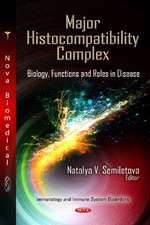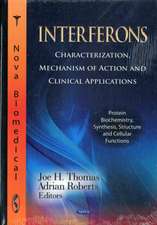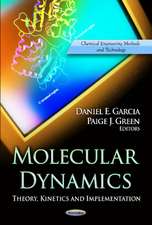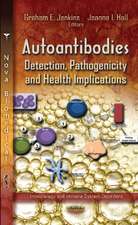Molecular Biology of B Cells
Editat de Tasuku Honjo, Michael Reth, Andreas Radbruch, Frederick Alten Limba Engleză Hardback – 11 noi 2014
Molecular Biology of B Cells, Second Edition offers an integrated view of all aspects of B cells to produce a normal immune response as a constant, and the molecular basis of numerous diseases due to B cell abnormality. The new edition continues its success with updated research on microRNAs in B cell development and immunity, new developments in understanding lymphoma biology, and therapeutic targeting of B cells for clinical application. With updated research and continued comprehensive coverage of all aspects of B cell biology, Molecular Biology of B Cells, Second Edition is the definitive resource, vital for researchers across molecular biology, immunology and genetics.
- Covers signaling mechanisms regulating B cell differentiation
- Provides information on the development of therapeutics using monoclonal antibodies and clinical application of Ab
- Contains studies on B cell tumors from various stages of B lymphocytes
- Offers an integrated view of all aspects of B cells to produce a normal immune response
Preț: 812.52 lei
Preț vechi: 1065.84 lei
-24% Nou
Puncte Express: 1219
Preț estimativ în valută:
155.48€ • 163.08$ • 129.43£
155.48€ • 163.08$ • 129.43£
Carte tipărită la comandă
Livrare economică 25 martie-08 aprilie
Preluare comenzi: 021 569.72.76
Specificații
ISBN-13: 9780123979339
ISBN-10: 0123979331
Pagini: 600
Dimensiuni: 216 x 276 x 41 mm
Greutate: 2.25 kg
Ediția:Revised
Editura: ELSEVIER SCIENCE
ISBN-10: 0123979331
Pagini: 600
Dimensiuni: 216 x 276 x 41 mm
Greutate: 2.25 kg
Ediția:Revised
Editura: ELSEVIER SCIENCE
Public țintă
Research level immunologists, molecular biologists and geneticistsCuprins
1. Ig loci: structure and expression regulation
2. The mechanisms of V(D)J recombination
3. Transcriptional regulation of B lymphocyte differentiation
4. B cell transcriptome
5. The role of microRNA in B cell development and function
6. Proliferation and differentiation program of developing B cells
7. Development and function of B cell subsets
8. Evolution of primordial B cell antigen receptor
9. The evolutionary origin of V(D)J diversification
10. Receptor organization on B cells and its signaling
11. Fc and complement responses
12. The dynamic structure of germinal center: generation of high affinity Ab
13. Cell Migration
14. B cell as regulator
15. B cell memory and plasma cell development
16. Roles of lymphotoxin and Baff on B cells
17. The mucosal immune system: host-bacteria interaction and regulation of IgA synthesis
18. Gut microbiota and their regulation
19. Regulation and function of activation-induced cytidine deaminase
20. Molecular mechanism of CSR
21. Molecular mechanism of SHM
22. Aberrant AID expression by pathogen infection
23. Chromosomal translocation and mutations in B cell leukemia and lymphomas
24. B cells producing pathogenic autoantibodies
25. HIV neutralizing Ab
26. Immune deficiency caused by B cell defects
27. IMGT® for immunoglobulin repertoire analysis and antibody humanization
28. Humanized monoclonal Ab production
29. Ab therapy against lymphoma
30. Anti-interleukin-6 receptor antibody therapy against autoimmune inflammatory diseases
31. Ab therapy against chronic inflammatory immune-mediated diseases
2. The mechanisms of V(D)J recombination
3. Transcriptional regulation of B lymphocyte differentiation
4. B cell transcriptome
5. The role of microRNA in B cell development and function
6. Proliferation and differentiation program of developing B cells
7. Development and function of B cell subsets
8. Evolution of primordial B cell antigen receptor
9. The evolutionary origin of V(D)J diversification
10. Receptor organization on B cells and its signaling
11. Fc and complement responses
12. The dynamic structure of germinal center: generation of high affinity Ab
13. Cell Migration
14. B cell as regulator
15. B cell memory and plasma cell development
16. Roles of lymphotoxin and Baff on B cells
17. The mucosal immune system: host-bacteria interaction and regulation of IgA synthesis
18. Gut microbiota and their regulation
19. Regulation and function of activation-induced cytidine deaminase
20. Molecular mechanism of CSR
21. Molecular mechanism of SHM
22. Aberrant AID expression by pathogen infection
23. Chromosomal translocation and mutations in B cell leukemia and lymphomas
24. B cells producing pathogenic autoantibodies
25. HIV neutralizing Ab
26. Immune deficiency caused by B cell defects
27. IMGT® for immunoglobulin repertoire analysis and antibody humanization
28. Humanized monoclonal Ab production
29. Ab therapy against lymphoma
30. Anti-interleukin-6 receptor antibody therapy against autoimmune inflammatory diseases
31. Ab therapy against chronic inflammatory immune-mediated diseases
Recenzii
"...comprehensively describes how B cells are generated, selected, activated, and engaged in antibody production and the normal immune response...This field has seen rapid advances...and it is an excellent resource. Score: 83 - 3 Stars" --Doody's







